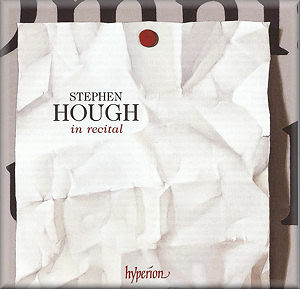 |
 |
|


alternatively
CD: Crotchet
AmazonUK
AmazonUS
|
Stephen Hough in Recital
Felix MENDELSSOHN (1809-1847)
Variations Sérieuses,
Op. 54 [10:45]
Ludwig van BEETHOVEN (1770-1827)
Piano Sonata
No. 32, Op. 111 [24:47]
Carl Maria von WEBER (1786-1826)
Invitation
to the Dance [8:04]
Frédéric CHOPIN (1810-1849)
Waltz
in C sharp minor, Op. 64 No. 2 [3:28]
Waltz
in A flat, Op. 34 No. 1 [5:42]
Camille SAINT-SAËNS (1835-1921)
Valse
Nonchalante, Op. 110 [3:34]
Emmanuel CHABRIER (1841-1894)
Feuillet d’Album [1:13]
Claude DEBUSSY (1862-1918)
La Plus Que Lente [4:15]
Franz LISZT (1811-1886)
Valse Oubliée
No. 1, S 215 No. 1 [3:02]
Mephisto Waltz No.
1, S 514, “Der Tanz in der Dorfschenke” [11:21]
Trad. (arr. Stephen Hough)
Waltzing
Matilda [2:56]
 Stephen Hough
(piano) Stephen Hough
(piano)
rec. July 2008, Henry Wood Hall, London
 HYPERION CDA67686 [79:02] HYPERION CDA67686 [79:02]  |
|
|
On paper, this piano recital by one of our finest pianists
looks intriguingly programmed: a first half focused on the
idea of variations, with Mendelssohn’s marvellous Variations
Sérieuses and Beethoven’s valedictory Piano
Sonata No 32, followed by forty-three minutes of waltzes, from
an assortment of different composers. Unfortunately, the concept
was somewhat more difficult for me to enjoy in practice than
it was on paper. Placement of the two ‘major’ works
first makes the album somewhat top-heavy: after Weber’s Invitation
to the Dance, just two of the last eight tracks pass the
five-minute mark. Moreover, Hough’s keenness to find
similarities between the seven waltz composers here represented
is a recipe for listening fatigue, even though the concept
is highly interesting from a musicological standpoint.
Does that make this an unsuccessful album? By no means! Even
this, maybe the least inspired of Hough’s impressive
line of recital albums, is better than most of the programmes
pianists offer us these days. How refreshing it is, for example,
to hear Beethoven’s final sonata without its two immediate
predecessors. How delightful, too, to find a modern performer
taking the Mendelssohn variations so seriously; they are enormously
satisfying on disc and in the concert hall, but few artists
of Hough’s stature seem to realize this.
Unfortunately the three bigger pieces on the program are the
least successful, though still enjoyable. In the first movement
of the Beethoven sonata, as in the Mendelssohn and most of
all the Liszt Mephisto Waltz, Hough has a certain tendency
to play with speed but without ferocity. Sviatoslav Richter,
in a live recording from Leipzig, November 28, 1963, released
on the Parnassus label, demonstrates how to drive the first
movement of the Beethoven sonata with demonic intensity and
heroic force. Hough is nearly as fast, but not nearly as intense.
His slow movement fares much better-again, not as magical as
Richter on modern piano or Paul Komen on pianoforte, but the
comparison is unfair. This is still a lovely arietta,
which both flows nicely and sings with plain-spoken beauty.
I quite like Hough’s gentle, poetic approach to the Mendelssohn
variations, but his hesitation to make a loud or ugly sound
becomes problematic in the Mephisto Waltz. This performance
is simply too tame. Where is the devilishness? This is the
first time I have listened to this work and been able to imagine
someone (aside from the Devil) waltzing to it.
The miniatures work extremely well, however, as one would expect.
Hough is actually at his most impressive in the two Chopin
waltzes, where his playing is marvellously beautiful and possessive
of a sort of deceptive simplicity which is most expressive.
This is Chopin playing of the highest order, immaculate but
unafraid, distinctly old-fashioned in its rubato and charm.
Hough has also, as is his custom, unearthed some truly impressive
disc-mates in the Saint-Saëns, Chabrier and Debussy. If
they sound of a piece, it is perhaps because the performer’s
unifying instinct makes as convincing a case as possible that
this music belongs together. They are, one and all, delights,
and the Weber is played in a similar manner as well: lushly
romantic and enticing, it teases us with the feeling of a secret
being kept, like a perfumed invitation from a secret lover.
All that remains to be said is that Hyperion’s engineering
is clear and honest, Hough’s piano sounds wonderful,
and the presumably live audience maintains an admirable silence.
If this repertoire interests you, or if you are feeling a little
adventurous, do not hesitate to give this new recital a listen.
It will not, perhaps, supplant your favorite readings of the
Beethoven or Mendelssohn, and Hough’s Liszt Mephisto will
find few admirers, but the Chopin and other waltzes are ravishingly
played, and Stephen Hough remains one of the most interesting
curators of little-known piano repertoire in our time. Hough’s
liner-notes, by the way, demonstrate an eloquence with the
written word to rival that at the keyboard, and his encore,
his own transcription of the “Waltzing Matilda,” is
arranged and performed with love.
Brian Reinhart
|
|
|












